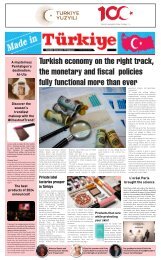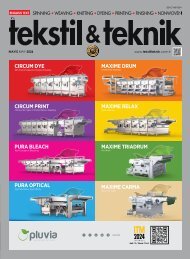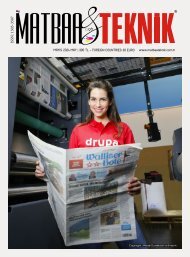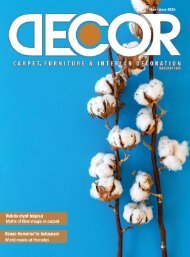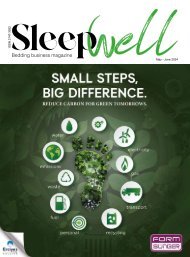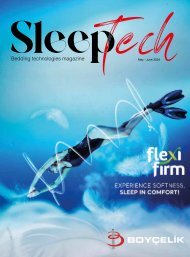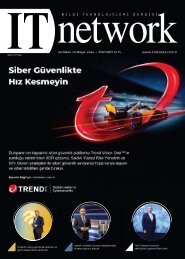Automotive Exports September 2020
Automotive Exports September 2020
Automotive Exports September 2020
Create successful ePaper yourself
Turn your PDF publications into a flip-book with our unique Google optimized e-Paper software.
www.automotive-exports.com September 2020
Monthly automotive aftermarket magazine
GROUP CHAIRMAN
H. FERRUH ISIK
PUBLISHER:
İstmag Magazin Gazetecilik
İç ve Dış Ticaret Ltd. Şti.
Managing Editor (Responsible)
Mehmet Söztutan
mehmet.soztutan@img.com.tr
Mehmet Soztutan, Editor-in-Chief
mehmet.soztutan@img.com.tr
Editor
Ali Erdem
ali.erdem@img.com.tr
Advertising Managers
Adem Saçın
adem.sacin@img.com.tr
Enes Karadayı
enes.karadayi@img.com.tr
International Marketing Coordinator
Ayca Sarioglu
ayca.sarioglu@img.com.tr
Driving force of the economy
Automotive industry holds the lion’s share in all industrialized countries. As the
moving industry of countries carrying all other industries, the automotive industry
generates a big aftermarket industry as well. Turkey has both. As the second largest
in commercial vehicles in Europe, Turkey’s main industry has been advancing
every day and its supply industry runs in parallel with the main industry.
As part of its commitment to transforming its automotive industry, which has
historically been a key economic driver in integrating the Turkish economy with the
global value chain, and to its vision of making Turkey an economic powerhouse,
Turkey has recently introduced its own locally-developed born-electric car built
upon strength stemming from the country's long-standing know-how in the area.
Keeping pace with the pandemic conditions on the one hand, the Turkish
automotive aftermarket industry has been improving and developing with
trainings, innovations and professional marketing techniques on the other. It is
expected that the new normalization and progress will be full steam in January.
No matter how other industries pause during such critical and miserable times, the
automotive industry has no brake for it is needed at every condition as medicine,
feeding and clothing. Even all these require the wheeled industry to reach the
needy. I wish healthy, happy and successful days for all.
Correspondent
İsmail Çakır
ismail.cakir@img.com.tr
Finance Manager
Cuma Karaman
cuma.karaman@img.com.tr
Accountant
Yusuf Demirkazık
yusuf.demirkazik@img.com.tr
Digital Assets Manager
Emre Yener
emre.yener@img.com.tr
Web Designer
Amine Nur Yılmaz
amine.yilmaz@img.com.tr
Technical Manager
Tayfun Aydın
tayfun.aydin@img.com.tr
Design & Graphics
Sami aktaş
sami.aktas@img.com.tr
Subsciption
İsmail Özçelik
ismail.ozcelik@img.com.tr
HEAD OFFICE:
İstanbul Magazin Grubu
İHLAS MEDIA CENTER
Merkez Mahallesi 29 Ekim Caddesi
No:11 Medya Blok Kat:1
34197 Yenibosna / İstanbul / Turkey
Tel: 0212 454 22 22
Faks: 0212 454 22 93
www.img.com.tr turkey@ihlas.net.tr
KONYA:
Metin Demir
Hazım Uluşahin İş Merkezi C Blok
Kat: 6 No: 603-604-605 KONYA
Tel: (90.332)238 10 71 Fax: (90.332)238 01 74
PRINTED BY:
İHLAS GAZETECİLİK A.Ş.
Merkez Mahallesi 29 Ekim Caddesi İhlas Plaza
No:11 A/41 Yenibosna–Bahçelievler/ İSTANBUL
Tel: 0212 454 30 00
www.ihlasmatbaacilik.com
OTSA, the only
OEM viscous fan
manufacturer
in Turkey and
Middle East
One of the world’s leading
manufacturers of cooling systems,
OTSA Automotive was established
in 1980 in Istanbul.
OTSA provides special viscous fan clutches
and complete system solutions as of OEM
and Aftermarket groups for wide variety
of vehicles ranging from passenger cars to
heavy vehicles.
Starting from the raw material entrance to
the final product exit, OTSA carries out all
the processes including Injection Molding,
Mechanical Processing, Electronics,
Assembly, Testing, Quality Control and
Packaging with fully automated machines
with up-to-date technology.
OTSA works with the R & D departments
of the leading OEM and OES companies
world-wide and offers solutions according
to the desired qualifications.
World-class engine cooling solutions
manufactured by OTSA are available on
Heavy Vehicles, Passenger Cars, Light
Commercial Vehicles, Buses, and Minibuses
as well as on Generators and Industrial
Compressors for Construction, Agriculture
and Mining purposes.
OTSA is in almost any area where you can
find engines with ideal cooling systems.
Aware of the fact that the world’s natural
resources are limited and that we should
therefore protect nature for future
generations, the company’s core objective
is to adopt and implement legal and
environmental principles in each of its
production progresses.
Accordingly, the company is committed
to assure that the company’s operations,
products and services are subject to the
environmental regulations of cooling
systems based products, guarantee
sustainable development in every
phase of production, comply with legal
obligations and other environmental
requirements, consistently monitor and
update environmental goals and objectives,
communicate its policy to all employees,
suppliers and clients, and make its policy
publicly available
Atilla Şamdan, general manager of OTSA,
briefs their principles as follows:
Quality of service and production is highly
important for our company, which is
focused primarily on customer satisfaction.
All phases of production are meticulously
checked by our experienced quality team in
accordance with our quality policy.
Production process is carried out in
compliance with the project and quality
management systems. If detected,
nonconformities are eliminated by taking
corrective and preventative actions.
All quality processes are being recorded
and monitored. Gathered data is analyzed
accordingly. If a nonconformity is detected,
it is corrected in the related process.
Customer feedbacks are seriously taken
in to consideration before eliminating
customer complaints.
September 8
Karsan invests
in spare parts in
Germany
Muzaffer Arpacıoğlu, Deputy General Manager of Karsan Commercial Affairs
Karsan implemented an important
project in order to expand its spare
parts and after-sales service network
in Europe. As part of the project, Karsan
will open a spare parts warehouse in
Nürnberg, Germany, and will be able
to send spare parts to any point in
Europe within 2 days. Stating that the
warehouse will start operating as of
September 1, Deputy General Manager
of Karsan Commercial Affairs, Muzaffer
Arpacıoğlu said, “We have commissioned
another important investment in order to
strengthen our after-sales service network
in Europe and to enable our dealers to
respond the requests in a very short time.
Based on our experience of more than 50
years, we know that after-sales customer
support has a significant role in being
preferred as well as brand reliability. This
structure will position us much closer to
our customers than ever.”
wOffering modern solutions that can adapt
to every city with the public transportation
systems it has developed, Karsan continues
to be the first choice of European cities
with its conventional and electric buses,
while expanding its spare parts and service
network. Karsan, which has made another
important investment in this direction, is
preparing to open a spare parts warehouse
in Nürnberg, Germany. Karsan will reduce
the lead time of spare parts, especially
parts of its electric vehicles, to 2 days
thanks to the warehouse that will start
operating on September 1. Thus, Karsan,
which will send the required parts to all
parts of Europe in a short time, aims to
increase customer satisfaction by providing
service with low cost in minimum time.
“We minimize distances”
Providing information on the subject,
Deputy General Manager of Karsan
Commercial Affairs, Muzaffer Arpacıoğlu
said, “We continue to receive orders in
significant quantities for both conventional
and full electric models from Europe,
which has started to recover after the
Covid-19 outbreak. Accordingly, we
have commissioned another important
investment in order to strengthen our
after-sales service network in Europe
and to enable our dealers to respond the
requests in a very short time. Based on our
experience of more than 50 years, we know
that after-sales customer support has a
significant role in being preferred as well as
brand reliability. Thanks to this structure will
position us much closer to our customers
than ever.” Combining the forces with
Barsan Global Logistics for on-site spare
parts service, Karsan plans to multiply its
operational power by taking advantage of
Barsan’s warehouses and logistics network
in 45 different countries in the future.
September 10
BETA Kimya
adds value to
the chemistry
industry with its
new production
facility
investment
BETA Kimya GEBKİM Campus, which is prepared to become the
production base of high-tech new generation adhesives to be produced
locally and nationally for the first time in the Turkish chemical industry
with an investment value of 315 million TL, will provide employment
for 500 people by operating with an annual production capacity of
150 thousand tons.
BETA Chemical Co. one of Turkey’s
oldest chemical companies, laid
the foundation of the largest
adhesive and glue production facilities
in Eastern Europe and the Middle East.
The groundbreaking ceremony of BETA
Kimya GEBKİM Campus was realized with
the participation of T.C. Industry and
Technology Minister Mustafa Varank,
T.C. Trade Minister Ruhsar Pekcan, TIM
President İsmail Gülle, BETA Kimya A.Ş.
Chairman of the Board Adil Pelister and
BETA Kimya A.Ş. General Manager Cihat
Sayacı. BETA Kimya GEBKİM Campus, which
is the new integrated production facility
of BETA Kimya A.Ş., and fully compatible
with digital transformation in the industry,
and green building technology with LEED
certification, will offer one hundred percent
local and national innovative products
for use in many strategic sectors such as
automotive, defense and aviation.
Varank: “A new breath to the chemical
industry”
Minister of Industry and Technology
Mustafa Varank, in the speech at the
groundbreaking ceremony of the Beta
Kimya GEBKİM Campus in Gebze Chemistry
Specialized Organized Industrial Zone
(GEBKİM), said that they witnessed an
exciting day for the real sector which
continues its path without stopping even
during the epidemic of the new type of
corona virus (Covid-19).
Stating that they are together to lay the
foundations of the largest adhesive and
glue production facility in the Middle East
and Eastern Europe, Varank said “Beta
Kimya GEBKİM Campus, which will come to
life with an investment of 315 million liras,
will make new employment opportunities
for 500 citizens. From the first day of our
visit to the Ministry with the appreciation
of our President, we have demonstrated
the vision of national technology and
strong industry. We are concerned with
developing new policies that will take this
vision further with every step we take.
We try to dominate the real sector in an
approach that encourages localization and
directs our companies to innovation. With
BETA Kimya Inc.’s new integrated facility
Adil Pelister, BETA Kimya A.Ş.Chairman of the Board
investment, the polyurethane reactive
hot-melt adhesive products and different
variants, so far imported, will begin to
be produced in Turkey for the first time.
Thus, an important input of the packaging,
automotive, furniture, construction,
defense and aviation industries will be
procured domestically. In the medium
term, an import of 120 million dollars will
be prevented. After domestic needs are
met, of course, the export potential will
also be evaluated. When this factory goes
into mass production, it will be one of the
most modern production facilities in our
country. I wish the BETA Kimya GEBKİM
Campus investment, which will bring a
new breath to our country’s industry and
the chemical industry, and I congratulate
everyone who contributed especially the
BETA Chemistry Board and İKMİB President
Adil Pelister.”
Pekcan: “Chemistry is the locomotive
sector for Turkey”
T. C. Trade Minister Ruhsar Pekcan, in her
speech at the Beta Kimya GEBKİM Campus
Groundbreaking Ceremony, by attending
with video conferencing, said that she
is pleased to be at the groundbreaking
ceremony of an investment of strategic
importance for the country. Minister
Pekcan said “BETA Kimya Inc.’s investment
in the new integrated production facility
is really very important for Turkey.
Because it coincides with our country’s
high technology and high value added
production and export strategy. Under the
leadership of our President, we will take
all necessary steps to bring our country to
the level of high-income countries together
with its political stability and effective
management system, more technology,
more value-added production and exports.
BETA Chemistry GEBKİM Campus will
make added value of Turkey’s production
September 14
deficit and imported products and also will
provide making exports to new markets.
In our country, it will provide domestic
input to many sectors such as automotive,
construction and defense industry, and
make employment for 500 people. I
congratulate the BETA Kimya Family for
their valuable investments and wish them
good luck for our country.”
Pelister: “It is a product of our vision to
make high added value”
Stating that they will bring a new value
to the chemical industry and Turkish
industry with BETA Kimya Gebkim Campus,
Adil Pelister, the chairman of the Board
BETA Kimya Inc., said “As BETA Kimya,
we have focused on growing, producing
and always creating high added value for
34 years. With our Apel and Mitreapel
brands, we have managed to become
a large industry family that exports
to 75 countries on 5 continents, with
approximately 150 products in 9 different
categories, from furniture to automotive,
textile to construction and even to health
with its COVID-19 pandemic. Today, BETA
Kimya Gebkim Campus, which we have
laid the foundation, is a product of our
excitement to make high added value.
Our new integrated facility, which will be
commissioned with an investment value
of 315 million TL with 100 % domestic and
equity capital, will be the largest adhesive
and glue production facility in the Middle
East and Eastern Europe.”
Pelister: “We will take a step in 5 new
products categories”
Expressing that they will focus on domestic
and innovative products for Turkey’s
strategic sectors with BETA Kimya GEBKİM
Campus, Adil Pelister said “With our new
integrated facility that will have an annual
production capacity of 150 thousand tons,
we will employ 500 people and we will
step into 5 new product categories with
high added value. Our LEED-certified,
eco-friendly green building production
campus will be one of the most modern
chemical facilities not only in our country
but also in the nearby geography, as a
giant integrated production facility built
on a total of 50 thousand m 2 , with a
closed area of 35 thousand m 2 . We take
pride in signing one of the best examples
of digital transformation in industry that
our state and ministries expect from us,
a step that will add value to our country
and the chemical industry. With our
new production facility, which will be
operational in the next year, we will be
ready for the future digital production
technologies. I wish it good for our
chemical industry, country industry and our
company.”
Sayacı: “We will produce new generation
pur hotmelt adhesives for the first time”
Stating that they are among Turkey’s 250
companies that invest most in R & D and
always focus on innovative products,
Cihat Sayacı, General Manager of BETA
Kimya Inc. said “With our BETA Kimya
GEBKİM Campus, we are signing a modern
integrated production facility project that
is of great importance for the Turkish
chemical industry and fully complies with
the principles of digital transformation. As
BETA Kimya, we have gained power from
R&D and innovation for 34 years and we
are committed to developing high-tech
products. We are also signing an important
investment move for R&D in our new
integrated facility. We are preparing to grow
our innovation base, which has an R&D
Center Certificate and consists of all Turkish
engineers, exactly 7 times here. With a R&D
team of 50 people, we will step into new MS
technology adhesives terminated with silane
and PUR Hot-melt products that we will
produce for the first time completely locally.
We will carry BETA Kimya to the future with
new generation innovative products that we
will develop specifically for the automotive,
packaging, building and furniture sectors
as well as nationally strategically important
sectors such as defense and aviation.”
July
16
Turkey: Motor
vehicle registrations
double in July
Nearly 138,900 vehicles registered in July,
according to official data
ANKARA – The number of motor vehicle registrations in Turkey
doubled in July (up 105.5%), compared to the same month
last year, according to official data released recently.
A total of 138,883 first- and second-hand vehicles were registered
last month, rising from 67,621 in July 2019, according to the Turkish
Statistical Institute. On a monthly basis, the figure was also up 82.6%.
The total number of road motor vehicles registered surpassed 23.65
million through the end of this July, TurkStat said.
Last month, automobiles accounted for the lion’s share of new
registrations -- 59.8% -- while small trucks accounted for 11.7%.
Motorcycles represented 22.5%.
In terms of distribution of model brands for new registered cars,
18.9% were Renault, 15.8% Fiat, and 6.9% Volkswagen.
In January-July, the number of registered vehicles climbed 38.4%
year-on-year to 526,939.
September 18
E-Commerce
automotive
aftermarket size
to reach $135 bn
by 2026
E-commerce Automotive
Aftermarket size is likely to exceed
USD 135 billion by 2026; according
to a new research report by Global
Market Insights, Inc.
OEMs are focusing on business
expansion by establishing the
aftermarket network in emerging
nations. The e-commerce channel
enhances the product visibility and
offers transparent pricing. Continuous
technological development and growing
customer expectations for economical
price and quality products will fuel industry
growth. The consumers are increasing
their inclination towards digital servicebased
business models. The market
players are upgrading their model based
on product buying behavior. E-tailers
are further improving their consumer
base by conducting studies pertaining to
consumer buying behavior and improving
the product offering. The e-commerce
automotive aftermarket from direct to
customer segment will witness around
16% CAGR through 2026. Development
of mobile-friendly user interface is
increasing e-commerce sales channels
across consumers. Customers can look for
multiple brands and enable simplified &
customized usage. Moreover, some portals
provide customer access in offline mode as
well, thereby propelling the market growth.
Increasing manufacturers on online
portals to support accessories segment
growth
The accessories segment is expected
to account for over 23% e-commerce
automotive aftermarket share with
growing registration of manufacturers on
online portals. The increasing popularity
of vehicle customization, rising inclination
toward enhanced driving experience,
growing focus toward better aesthetic
appeal, and convenience will trigger
the accessories growth. Furthermore,
manufacturers are introducing e-commerce
sites that offer a connection between
service technicians and suppliers to
improve industry foothold.
B to small B consumers primarily
include equipment suppliers that buy
basic and majorly used automotive
replacement components. Manufacturers
of sub-assembly systems and electronic
components are among major consumers
in the B to small B distribution. Superior
profit margins and quick delivery along
with ability to easily compare and buy
parts are the key factors driving the B to
small B distribution segment. Furthermore,
reduced complexity in purchases including
RFQs and quotations will provide a positive
outlook for industry growth.
Asia Pacific e-commerce automotive
aftermarket size is projected to expand at
more than 15% CAGR up to 2026 owing
to presence of multiple industry players.
The region has multiple e-tailers including,
platforms such as Alibaba and India mart.
Increasing awareness regarding online
distribution channel amongst small &
medium manufacturers in emerging
economies is accelerating the revenue
generation.
Major automotive OEMs introducing
e-commerce platform for consumers
In March 2019, Mahindra & Mahindra
announced its genuine spare parts to be
available on M2ALL.com. The company
partnered with online stores in order to
provide its customers with convenience.
Similarly, United Pacific Industries, based
in the U.S., launched a classic car parts
e-commerce website to expand its reach.
The company boasts a portfolio of over
6,000 parts of vehicles as old as 1932.
Industry participants are enhancing
delivery services to offer products
more quickly to a wider audience. Key
e-commerce automotive aftermarket
players include Alibaba Group, Amazon,
Arch Auto parts, Autoanything, Advance
Auto Parts, AutoZone, Bosch, CARiD, Denso
Corporation, Ebay, Flipkart, and O’Rielly
Auto Parts.
September 22
Emerging from
the crisis,
companies
should focus on
three key issues:
Work remotely,
work quickly
and work safely
Over 200 industry leaders from
transportation & mobility joined
us online for a live interactive
event – Driving Resilience in Automotive &
Transportation. Dassault Systèmes experts
and customers joined online, sharing
insights, tools and approaches to get back
on track in 2020 and continuing beyond in a
more resilient position. The transportation
and mobility industry transformed to the
new era of mobility-on-demand with new
solutions that are more environmentallyfriendly,
more citizen-friendly and more
affordable. However, the COVID-19 crisis
posed dramatic challenges in an instant
– global lock down, dramatic drop in car
sales, drop in production, all igniting a deep
change in people’s relationship with cars.
Car makers and suppliers demonstrated
their agility by adapting to new consumer
purchasing behaviors, scaling remote
working across all parts of the business and
investing in processes to ensure they have
the right data in real time to make the right
decisions. Companies also demonstrated
their responsibility – adapting production
quickly to produce masks, respirators,
medical equipment needed to overcome
shortages to combat the crisis.
Emerging from the crisis, companies
should focus on three key issues: WORK
REMOTELY, WORK QUICKLY and WORK
SAFELY.
WORK REMOTELY: Enable remote-office
collaborative engineering efficiently for
everyone
Lightyear is a new player in the OEM
landscape, designing next-generation clean
mobility for everyone, everywhere using
solar energy. Their mission: make a positive
impact and take responsibility for energy
transition. By 2035, they plan to deliver
Lightyear One, the world’s first long-range
solar car. Arjo Van Der Ham, Co-Founder
and Chief Technology Officer, described
how Lightyear teams easily transitioned
to working from home thanks to the
3DEXPERIENCE platform on the cloud.
During the lockdown, they actually
improved meeting efficiency, collaboration,
productivity, lead-time and agility, although
challenges remain for physical prototyping
and testing. Staying connected through
a virtual 3DEXPERIENCE twin, shared
intelligence with data from everywhere and
powerful project planning, work stayed on
track.
Lightyear is continuing remote working
and exploring new ways of attracting
talents and hiring people from all over
the world. Going forward, they see the
entire ecosystem of stakeholders, future
customers and suppliers could benefit this
new kind of relationship, powered by the
platform and cloud.
WORK QUICKLY: Accelerate simulation and
testing with no physical equipment
Frédéric Merceron, Solution Director for
the Transportation & Mobility industry
at Dassault Systèmes, looked at how
simulation helps promote and accelerate
agility. Making a difference in the market
today is about improving comfort and
well-being for drivers and passengers.
COVID-19 revealed just how important
that is. We can optimize comfort, health
and well-being inside vehicles in a number
of ways. For example, we can simulate
visibility, taking into account windshield
fogging and look at how to improve air
quality and overall airflow circulation.
Cabin comfort is important, and becoming
very complex. Cabin infotainment
systems and electronic controls are part
of the experience. With so many vehicle
domains and performance interconnected,
simulations are demanding. Cabin comfort
also demands energy, so it is important
to optimize best comfort with minimum
energy consumption.
Dassault Systèmes’ wants to make
simulation available for everyone with a
range of simulation. We want to create
an environment where engineers and
designers can interact for the best results,
as well as offer more access to high-end
applications and specialists when needed.
Finally, deployment needs transparency
and simplicity, with easy-to-implement
September 24
digital solutions that are affordable.The 3DEXPERIENCE
platform delivers ready-to-use simulation solutions that have
been developed with customers over the last 30 years. Userfriendly
interfaces and solutions, on-demand simulation
and computing capacities on the cloud, with remote quality
support from experts when needed, enable customers to
purchase only what they need and when they need it.
WORK SAFELY: Ramp up healthy production
Manufacturing has many constraints and risks that
are critical to anticipate in order to be more agile and
resilient. Henri Beringer, Business Consultant Director in
Transportation & Mobility industry at Dassault Systèmes,
took a closer look at making agility the norm, while
improving safety without compromising efficiency.
It starts with creating an accurate view of factories and
manufacturing assets. Generating an executable digital
model – a 3DEXPERIENCE twin – enables accurately
simulating the plant in operation to investigate alternative
future operations while not disrupting current production.
The 3DEXPERIENCE twin is key to efficiency gains –
understanding and improving facilities faster, avoiding costly
disruptions, and seeing potential impacts of a change.
Benefits can include reducing new product commissioning
time by 50%, time-to-market by 30%, production and
logistics costs by around 20%, while improving worker safety
by 25% with fewer work accidents and lower illness rates.
The virtual 3DEXPERIENCE twin can also accelerate more
drastic changes, such as developing a manufacturing process
for completely new products. During the COVID-19 crisis,
automotive industrials transformed their production lines
to manufacture face shields and respirators, reusing their
existing industrial assets.
The recent COVID-19 crisis will likely not be the last we will
face, but the resilience of the industry has been proven.
We are now better equipped, with software as a service,
on the cloud, remote working and support, simulation
to predict and correct product behavior, efficient and
safe manufacturing production, and all through the
3DEXPERIENCE platform. While the recent crisis accelerated
this transformation, it seems we have arrived at the right
time now.
25
Turkish
automotive
industry
prospering
Turkey’s Automobile Joint Venture Group,
known as TOGG, will produce five different
models on a joint platform with fully-owned
intellectual and industrial property rights by
2030. The first of these Turkish vehicles are
expected to hit the market in 2022.
become an important part of the global
value chain of international OEMs. Meeting
and exceeding international quality
and safety standards, today’s Turkish
automotive industry is highly efficient
and competitive thanks to value-added
production. As part of its commitment to
transforming its automotive industry, which
has historically been a key economic driver
in integrating the Turkish economy with
the global value chain, and to its vision of
making Turkey an economic powerhouse,
Turkey has recently introduced its own
locally-developed born-electric car built
upon strength stemming from the country’s
long-standing know-how in the area.
Accordingly, Turkey’s Automobile Joint
Venture Group, known as TOGG, will
produce five different models on a joint
platform with fully-owned intellectual and
industrial property rights by 2030. The first
of these Turkish vehicles are expected to
hit the market in 2022.
•Leveraging a competitive and highlyskilled
workforce combined with a dynamic
local market and favorable geographical
location, the vehicle production of 9 global
OEMs in Turkey has increased by almost
five times from 300,000s in 2002 to over
1.5 million units in 2018. This represents
a compound annual growth rate (CAGR)
of around 10 percent during that period.
Over the past five years alone, MAN has
increased its production by 143 percent,
Toyota by 95 percent, Ford by 52 percent,
and Fiat by 35 percent.
The foundation of Turkey’s automotive
industry dates back to the early
1960s. During a period of rapid
industrialization and progress, this key
sector transformed itself from assemblybased
partnerships to a full-fledged
industry with design capability and
massive production capacity. Since 2000,
original equipment manufacturers (OEM)
have invested over USD 15 billion in their
operations in Turkey. These investments
significantly expanded their manufacturing
capabilities, which in turn led Turkey to
September 28
•Significant growth posted by Turkey’s
automotive sector led to Turkey becoming
the 15th largest automotive manufacturer
in the world and 5th largest in Europe by
the end of 2018.
•Turkey has already become a center of
excellence, particularly with respect to the
production of commercial vehicles. By the
end of 2018, Turkey was the number two
producer of commercial vehicles (CVs) in
Europe.
•Proven as a production hub of excellence,
the Turkish automotive industry is now
aiming at improving its R&D, design, and
branding capabilities. As of 2019, 184
R&D and design centers belonging to
automotive manufacturers and suppliers
were operational in Turkey.
•Notable examples of global brands
with product development, design, and
engineering activities in Turkey include
Ford, Fiat, Daimler, and AVL. Ford Otosan’s
R&D center is one of Ford’s three largest
global R&D centers, while Fiat’s R&D
center in Bursa is the Italian company’s
only center serving the European market
outside its home country. Meanwhile,
Daimler’s R&D center in Istanbul
complements the German company’s
truck and bus manufacturing operations
in Turkey. AVL Turkey, which opened up
its 2nd R&D center in Turkey, started to
develop autonomous and hybrid vehicle
technologies.
•Turkey offers a supportive environment
on the supply chain side. There are around
1,100 component suppliers supporting the
production of OEMs. With the parts going
directly to the production lines of vehicle
manufacturers, the localization rate of
OEMs varies between 50 and 70 percent.
•Turkey is home to many global suppliers.
There are more than 250 global suppliers
that use Turkey as a production base, with
30 of them ranking among the 50 largest
global suppliers.
•ww Auto manufacturers increasingly
choose Turkey as a production base
for their export sales. This is evidenced
by the fact that 85 percent of vehicle
production in Turkey was destined for
foreign markets in 2018. More than 1.3
million vehicles were exported from
Turkey to foreign markets in the same
year. In addition, Turkey was the number
one vehicle exporter to European
markets with 1.1 million units in 2018.
September
30
Performance
of the Turkish
automotive
industry in the
first half
decreased by 16 percent in the heavy
commercial vehicle group and 33 percent
in the light commercial vehicle group.
Compared to the January-July period of
2019, the commercial vehicle market
increased 65 percent, the light commercial
vehicle market increased 66 percent and
the heavy commercial vehicle market
increased 58 percent.
In the January-July period of 2020,
compared to the same period of the
previous year, total automotive exports
decreased by 36 percent on unit basis
and automobile exports by 32 percent.
During this period, total exports were 480
thousand 425 units, while automobile
exports were 333 thousand 725 units.
In the January-July period of 2020,
compared to the same period of the
previous year, total automotive exports
decreased by 29 percent in Dollar terms
and 28 percent in Euro terms compared
to the same period of the previous year.
During this period, total automotive
exports were $ 13 billion, while automobile
exports decreased by 27 percent to $ 5
billion. Automobile exports in Euro terms
decreased by 26 percent to 4.5 Billion €.
In the January-July period of 2020, total
production decreased by 27 percent
and automobile production by 24
percent compared to the same period
of the previous year. During this period,
total production was 636 thousand 757
units, and automobile production was 440
thousand 103 units.
In the January-July period of 2020, the total
market increased by 60 percent compared
to the same period of the previous year
and reached 351 thousand 319 units.
In this period, the automobile market
increased by 59 percent and was 273
thousand 22 units.
In the commercial vehicle group,
production shrank by 32 percent in the
January-July period of 2020, while it
September 32
Romania chooses
Karsan Jest
Electric again
Jest Electric wind still blows in
Romania! The company won the
tender for 8 electric minibuses in
Beclean!
Offering transportation solutions for
the mobility needs of the century
in its factory located in Bursa, the
commercial vehicle manufacturer Karsan
was awarded the tender held in Beclean,
Romania for electric minibuses. Having
secured the tender for 10 electric minibuses
recently held in Suceava, Romania, Karsan
signed the contract for the delivery for 8
units of Jest Electric vehicles which will
provide service in Beclean. Karsan will
deliver the Jest Electric vehicles by the end
of the year as a result of the tender it was
awarded while continuing to increase its
power in the Romanian market where it has
been operating since 2013. Offering modern
solutions in public transportation systems
that can be adapted to any geography,
Karsan completely maintains its place as
a go-to brand in Romania. Karsan recently
signed a contract for the delivery of 10 Jest
Electric vehicles to Suceava, and it also won
the tender for electric minibuses held in
Beclean, which is another city of Romania.
Within the tender which was secured via
its regional representative, AAR (Anadolu
Automobil Rom), Karsan will deliver 8 Jest
Electric vehicles by the end of the year to
provide service for the city. Deputy General
Manager of Karsan Commercial Affairs
Muzaffer Arpacıoğlu made statements
about the subject and stated the
following:“Within the scope of our efforts
to increase our share in the Romanian
market, we consistently continue to receive
orders from different cities of the country
and secure public transport tenders. Within
a short amount of time after we won the
tender for 10 vehicles in Suceava, we also
won the tender in Beclean and increased
our share in the Romanian electric vehicle
market. Karsan’s cutting-edge technology,
environment-friendly vehicle Jest Electric
and the satisfaction from the service
provided under Karsan guarantee play a
significant role in this success”.
High performing and environment-friendly
Jest Electric!
A proven performer which comes with
high maneuverability and superior
passenger comfort, Jest Electric is
equipped with a BMW electric motor
capable of 170 HP power and 290 Nm
torque with optional 44 or 88 kWh
batteries, again manufactured by BMW.
Offering the best performance in the
6-meter bus class with a range of up to
210 km, small city bus Jest Electric also
boasts a regenerative braking system
which provides energy recovery by
enabling the batteries to self-recharge at
a rate of 25%. Decorated with a 10.1-inch
multimedia touchscreen, fully digital
dashboard, keyless go, and USB ports
as well as an optional WiFi compatible
infrastructure, Jest Electric does not come
short in terms of comfort compared to
passenger cars thanks to its 4-wheel
independent suspension system.
September 36
Adhesives &
Bonding Expo
measures
the Impact
of Covid-19
on the Foam
and Adhesives
& Bonding
Industries
Foam Expo is the right place to
source the latest technologies and
manufacturing innovations to stay
ahead of your competitors. It is the best
venue to discover new solutions to solve
your manufacturing challenges and
optimize your products. It is also the best
place to meet over 500 specialist suppliers
form all sectors of the foam and adhesive
supply chains. The show is an ideal place
to learn the latest trends challenges and
opportunities experts at free-to-attend
conferences. During the period between
April 16, 2020 and May 6, 2020, Foam Expo
and the Adhesives & Bonding Expo reached
out to its community of end-users and
OEMs, foam and adhesives manufacturers,
converters and fabricators, raw material
and chemical suppliers, to understand how
the Covid-19 pandemic is having an impact
on their businesses, and what the effects
and consequences may be for the supply
chain in the longer term.
Through an anonymous online survey, 224
industry professionals shared their insight
and sentiment during that challenging
time. The organizers of the show arranged
a comprehensive report with the results of
the survey which benchmarks the status of
the foam and adhesives & bonding supply
chains. They invited a panel of four industry
experts to review the results in a live
webinar and discuss the current status of
the market and how they view the future
of the industries. Some of the points they
made were included in the report.
The survey is representative of the whole
supply chain as there is a relatively even
spread in responses from different tiers,
though it is worth pointing out that the
majority of the respondents seem to be
in some kind of leadership role either as
manager or senior executive, which makes
up 85% of the total.
In addition, a majority of 59% work for
small to medium sized companies (up
to a size of 500 employees) and are
predominantly based in North America
(84%) as only 9% indicated to be based in
Europe and 4% said they were based in
Asia Pacific. The remaining 3% is based in
Latin America and Africa.
The majority of respondents indicated
their company’s growth was performing
September 40
well before the outbreak: 74% of the
organizations either performed in-line with
projections or were sustainably performing
beyond projections. Segmentation of the
results into the specific tiers in the supply
chain shows a similar pattern across all
categories.
Automotive, construction and packaging
were the top performing markets before
the pandemic.
The report of Adhesives & Bonding Expo
details the impact of the pandemic by
months and offers valuable information
about the industry as below:
Given the spread of the virus from the end
of December 2019 throughout China and
the rest of East Asia, some business already
started noticing economic impact before
the virus outbreak was declared
a pandemic by the WHO on March 11,
2020. Although only 9% of the total
respondents indicated to have started
noticing an impact as early as January,
nearly a quarter (23%) of end-users / OEMs
/ component manufacturers said they
started noticing the impact during this
month.
A fifth of the total respondents started
noticing the economic impact in February:
it consisted of 29% of the testing and
engineering services, 22% of the suppliers
of chemicals / raw materials / additives and
21% of the foam and adhesives & bonding
manufacturers.
65% of all organizations indicate March
as the month they started to feel the
economic impact. On March 11, 2020,
President Trump suspended nearly all
foreign travel as a response to the WHO’s
categorization of
the disease as a pandemic and most states
had entered lockdown by the end of the
month. A majority of converters and
fabricators (72%), foam and adhesives and
bonding manufacturers (66%), chemicals
/ raw materials / additives suppliers
(64%) and end-user / OEMs / component
manufacturers (57%) all started to take a
hit during this time.
Only 7% of organizations are saying they
were not yet experiencing any economic
impact at the time of the survey, within
this group a third are foam and adhesives
manufacturers and a fifth converter /
fabricators.
Looking ahead – how will Covid-19 impact
the future of the Foam and Adhesives &
Bonding Supply Chain
In order to get some insight into how the
pandemic has affected business priorities
and investment strategies for companies
within the foam adhesives supply chains
we asked the respondents to indicate
how their businesses prioritized certain
activities before the pandemic, which
activities continued during the pandemic,
and how much strategic investment they
expect for these activities over the next 24
months.
Prior to the outbreak of the pandemic in
March, the foam and adhesives & bonding
supply chain prioritized the following
business activities: corporate sustainability,
new product development and launching
products, sales and account management,
R&D, and marketing and business
development.
During the pandemic, most business
activities were down to minimal
operationality, although sales and account
management as well as marketing and
business development continued on
reduced activity levels.
Looking ahead, industry professionals
September
42
expect that sales and account management
and marketing and business development
will become more important in future
investment strategies.
It seems the supply chain will mainly
be consolidating their manufacturing
activities as respondents expect that
there will be slightly less investment in
hiring and developing talent, expanding
manufacturing capacities and mergers &
acquisitions.
Future outlook on business plans
While much will remain uncertain for
the ongoing future, it is important to
look ahead to how the industry can and
will recover from this period of severe
disruption. Our respondents do expect
increased investment in sales and account
management, and marketing and business
development, undoubtably to try and
recover the losses brought on by the crisis.
When asked about the top challenges in
ensuring business continuity, respondents
indicated that a reduction in orders and
sales is the biggest challenge for their
business at present. Otherwise, it seems
the supply chain is relatively robust in
their ability to deliver raw materials
and fulfilling & delivering orders. This is
reinforced by the results of the sentiment
poll. The majority of the respondents feel
there is enough inventory and availability
of materials and components to continue
production in the event of a prolonged
disruption in the supply chain.
They are less optimistic regarding the
impact on a business’ revenue. As
economies globally are taking a hit and
supply chains and demand have slowed
down, it is difficult to say how the impact
on revenue will develop in the coming
months, though the rise in demand within
the medical and pharma sectors, and the
fact that many companies throughout the
supply chain are able to continue their
manufacturing activities, offers many new
opportunities.
Finally, we investigated sentiment towards
their employer’s handling of the crisis and
the impact on their own work life.
On average, respondents indicated to
be optimistic regarding their employer’s
preparedness to the outbreak of the
pandemic, as well as its communications
to employees and customers. They do not
feel that working remotely has impacted
their personal situation much, such as
keeping up productivity while working from
home and maintaining a work-life balance.
Of course, it must be noted that the
majority of respondents are in a leadership
role themselves. However, 23% of the
respondents do feel that there was room
for improvement. When asked to elaborate
if their organization could have done to
better prepare for the outbreak some of
their feedback included:
better support for working from home,
better and faster communication,
contingency plans, better availability of
virtual tools, identifying which customers
were vulnerable for shutdown, embracing
technology sooner, stock PPE and to not
keep inventory levels so tight.
Having said that, an overwhelming majority
of 77% of the respondents think that their
organization couldn’t have done anything
else to better prepare for a black swan
event like this pandemic.
September
44
Mahindra and REE Automotive sign
an MOU to establish a strategic
collaboration for the development of
electric commercial vehicles
• Partnership to leverage REE’s corner
module and modular platform technology
and Mahindra’s vehicle design, engineering,
sourcing capability and manufacturing
assets.
• MOU is primarily aimed at global markets
with current global volume estimated over
time at 200,000- 250,000 units.
Mumbai/Tel Aviv – Mahindra &
Mahindra, part of USD 19.4
billion Mahindra Group, and REE
Automotive today signed a memorandum
of understanding (MOU) to explore
development and manufacturing of electric
commercial vehicles for global markets.
Such a strategic collaboration will leverage
REE’s revolutionary electric vehicle corner
module and platform technology of
integrating powertrain, suspension and
steering components in the arch of a vehicle
wheel. This coupled with Mahindra’s wellestablished
vehicle design, engineering,
sourcing capability and manufacturing
assets, is set to be a win-win strategic
partnership for both companies.
The partnership will support REE’s global
customer need for 200,000-250,000 electric
commercial vehicle units over a few years,
including potential Mahindra’s domestic and
international volumes. Production would be
scaled further to support additional volume
in the global as well as Indian market.
“Our collaboration with REE has the
potential to bring a disruptive approach
to a new age of vehicles capitalizing on
our respective strengths,” said Rajesh
Jejurikar, Executive Director (Auto and
Farm Sectors), Mahindra & Mahindra. “The
competitive advantages of REE’s corner
modular architecture with our experience
in conventional vehicle system design,
engineering, sourcing ecosystem and
significant production capacity, provides
a perfect match to deliver exciting zero
emission vehicles, including autonomous
vehicles that can meet customer needs as
never before.”
REE’s architecture will enhance Mahindra’s
capabilities in the electric vehicle sector.
REE will leverage Mahindra’s global
presence and its unique volume flexibility
capability as well as its engineering and
product development expertise.
“We are excited to partner with Mahindra
to explore synergies that will allow us to
address our customers’ needs based on
Mahindra’s footprint and capabilities.
Mahindra’s unique cost structure, design
and engineering capabilities and volume
flexibility will be key to our ability to
address the majority of the commercial EV
market with both large volume vehicles
as well as more targeted mission-specific
vehicles,” said Daniel Barel, REE Co-founder
and Chief Executive Officer. “Having a
partner like Mahindra joining our growing
OEM partners network will allow us to
drive our EV technology faster and at
scale”.
REE’s transformational technology is
designed for current and future e-mobility
applications, including autonomous
vehicles, and offers significant benefits
in terms of weight, space and total body
design flexibility.
The scalability of the platform makes it
ideal for any form of electric vehicle such
as commercial vehicles, mid-duty delivery
trucks, last mile delivery, passenger cars,
taxis and shuttles.
September 46
July auto sales
in Turkey
impressive
Animesh Kumar, Director
of Automotive Consulting at GlobalData
Following the news that automotive
sales in Turkey grew by 387.5% yearon-year
in July 2020, according to
Automotive Distributors Association
Animesh Kumar, Director of Automotive
Consulting at GlobalData, a leading
research and consulting company, offers
his view:
“The surge in sales is impressive but not
unbelievable in light of Turkey’s effective
response to the COVID-19 crisis. While
economic impact was inevitable, the
Turkish Government and the Central Bank
of the Republic of Turkey (CBRT)’s timely
and effective actions such as the 21-point
stimulus package, reduced interest
rates and the deferral of social security
premiums helped the country overcome
challenges.
“The low interest rates and attractive
packages helped automotive customers
overcome the concerns regarding economic
uncertainty. Attractive, low-interest vehicle
loans for two-wheelers, as well as new and
used passenger vehicles has significantly
driven customer’s interest towards personal
mobility.
“Another key factor that contributed to
the surge in automotive sales since June
is easing of country-wide movement
restrictions. June and July witnessed
significant pent-up demand from March,
April and May, when the country was
majorly under lockdown to contain the virus.
“It is questionable as to whether the spike
in sales is sustainable. It depends on, firstly,
whether there is a significant demand of
vehicles left in the domestic market. In
order to leverage the attractive packages,
customers may have pulled forward their
purchases and the demand for vehicles for
2020 may have been largely exhausted.
The second point is whether the local
manufacturers that were more focused
on exports can respond to the domestic
demand to maintain adequate supply.”
September 48
New product
category from
Seger, the world
brand on horn
Ranking in the top 10 horn
manufacturers worldwide
while being the leading horn
manufacturer in Turkey and
exporting its products to more
than more than 70 countries, Seger
diversifies its product range with
the new product category “Lighting
Equipment” in the automotive subindustry
market.
Being a global brand in horn production
and now expanding its product
category with automobile interior and
exterior lighting equipment, Seger’s new
products include halogen lamps; Standard,
super vision, crystal white, Xenon white
ultra and Xenon yellow models are available.
The category was created by giving priority
to Xenon (HID) bulbs, signal lights and
interior lights that are preferred for the
interior ambience of cars, which provide
visibility comfort especially at night.
Success in horn will inspire lighting
Seger’s Vice President of Board Selim
Baykal, who stated that they set out to
continue the success of the horn in the field
of automobile lighting of Seger, which is the
voice of many world brand automobiles,
large transportation vehicles and even
ships today, said; “Seger is a global
brand with high recognition in national
and international automotive spare
parts markets with its horn design and
production. We did not limit this potential
based on the trust we have created in the
market to the horn, but wanted to serve our
suppliers in a different category. We will also
market lighting-related products with our
reliable brand that has a place in the world.
“Our initial product range includes halogen
and xenon bulbs of automobile headlights,
miniature bulbs for signaling and interior
lighting.”
With our dynamic structure, we will offer
products for various needs
Selim Baykal, who is the Vice President of
Board of Seger that offers different products
Seger’s Vice President of Board Selim Baykal
to the world markets with its reliable and
globally recognized brand, continued his
words as follows: “To increase our business
volume and turnover and concurrently
provide more foreign exchange income to
Turkey in doing so, is also among our highest
priorities. Our lighting products will also
meet our customers through our existing
dealer channels. Our halogen bulbs in our
product range provide standard, super
vision, crystal white, Xenon white ultra
and Xenon yellow models up to 20 meters
longer than standard bulbs, providing
excellent visibility for drivers driving at
night. At the same time, our products make
it possible to have better visibility in urban
traffic, night off-road rides and bad weather
conditions. We also have miniature bulbs for
signal lights and interior lights. While these
bulbs perfectly illuminate the interior of the
vehicle cabin, they can also be used in heavy
vehicles, thanks to their long life. “
September 52
ASEAN vehicle
sales plunge
66% in Q2 2020,
yet sales will
stabilise by
the end of the
decade, says
GlobalData
Sales of new vehicles in Southeast
Asia’s six largest markets combined
are estimated to have declined by
almost 66% to 291,889 units in the second
quarter of 2020, according to GlobalData, a
leading data and analytics company.
David Leggett, Automotive Analyst at
GlobalData, comments: “The ASEAN
vehicle market largely shrugged off the
threat of COVID-19 in the first two months
of the year, but the crisis severely dented
vehicle demand in the region from March
and the trend worsened in Q2.”
Countries such as Vietnam and Thailand
have been more successful than others
in bringing the virus under control, but
all countries have suffered significant
economic damage as a result of the
pandemic - and vehicle sales have been
hit hard. Export demand has also declined
sharply, while weak commodity prices
continue to affect incomes and investment
across the region.
Leggett continues: “There were some
positive signs in June sales. In Thailand, for
example, vehicle sales in June were still
sharply lower year-on-year (YOY), but they
were 43% higher than in May. Demand
should stabilize and improve through the
remainder of the year.”
Although 2020 is seeing a setback for the
automotive sector in ASEAN markets,
long-term prospects for the region remain
very strong. GlobalData’s analysis points to
strong indicators for long-term demand as
motorization rates rise with high economic
growth - especially in Indonesia, with a
population of 273 million, and its market of
around one million new vehicles a year is
forecast to double to two million vehicles a
year by the end of this decade.
Leggett adds: “In addition to strong longterm
market prospects, the automotive
manufacturing industry in the region
benefits from relatively low costs, favorable
government policies for investment, as well
as free trading regimes for vehicles and
components.”
September 56
COVID-19
pandemic
breathes new
life into electric
scooters
The UK Government recently fasttracked
a permit to allow electric
scooter rentals on public roads. The
move forms part of a broader investigation
into greener travel and overcrowding on
public transport as the COVID-19 pandemic
rages, according to GlobalData, a leading
data and analytics company.
Before the pandemic struck, the scooter
industry was facing strong financial
headwinds. Last January, market leader
Lime said it would lay off around 14% of
its workforce (roughly 100 employees) and
shutter operations in 12 markets as it seeks
to become profitable this year. However,
there is now a resurgence of interest in
what is termed active travel (outdoor
transport modes), including electric
scooters, with the rental sector picked for
year-long trials in the UK.
Calum MacRae, Automotive Analyst
at GlobalData, comments: “For those
returning to the office the car may not
be an option due to access or parking
restrictions, and, given the current
situation, many do not feel entirely
comfortable using public transport. Hence,
it is not surprising that electric scooters
and bikes are being seen as less risky for
wary commuters.
“While the benefits of shared scootering
are clear, there are still some issues to
address, including those for governments
and insurers. Who is to blame if an accident
causes injury to a pedestrian or damages
property? Fast-tracked scooter pilots in our
cities is of concern to safety campaigners
too.
“However, interest in sustainable travel
and in micro-mobility solutions for urban
areas – including rentable electric scooters
– has been given a shot in the arm by the
COVID-19 pandemic. The year-long trials in
British cities could give the scooter rental
sector a major long-term boost.”
Turkey’s gas
discovery to
have positive
impact on
foreign policy
ANKARA – Turkish President Recep
Tayyip Erdogan announced that
the Fatih drilling vessel discovered
the country’s largest energy source in
its history -- 320 billion cubic meters of
natural gas in the Black Sea.
The historic discovery did not just come
out of blue. Fatih, named after the
great Ottoman Emperor Mehmet II who
conquered Istanbul, has been drilling in
the Black Sea region since July 20. On its
ninth deep drilling operation, the vessel
hit jackpot.
Energy demand has been one of the main
burdens on the Turkish economy, with
Ankara paying tens of billions of dollars
annually to meet the country’s energy
need. The discovery is projected to ease
the financial burden for a number of years
as Erdogan said authorities were planning
to have the natural gas reserve ready for
Turkey in 2023.
The discovery is not likely to end Turkey’s
dependence on foreign alternatives but
Erdogan said the reserves found were
“only part of much richer resources”
given the fact that Turkey has one of
world’s top drilling and seismic operation
fleet and also holds operations in the
Eastern Mediterranean, rich in terms of
Discovery of its largest
natural gas deposits will have
ramifications on its foreign policy,
experts say
September 60
hydrocarbon reserves, along with the Black
Sea region, Turkey’s energy dependence
might decline significantly in the future.
In fact, further discoveries might even
turn the energy-hungry country into an
exporter.
It goes without saying that politics
and energy issues go hand-in-hand in
the international arena and Turkey’s
discovery is likely to have foreign policy
repercussions.
Mehmet Seyfettin Erol, head of the Ankara
Centre for Crisis and Policy Research
(ANKASAM), said the natural gas discovery
paved the way for independent policies
and might increase Turkey’s regional
influence.
“Natural gas and oil were sometimes
weaponized against Turkey, therefore, the
discovery is likely to strengthen Turkish
position in the sense of safety of energy
supply,” Erol said, adding energy relations
between Turkey and Russia might be
effected by the discovery.
Arguing that Moscow would have a
“weaker hand” against Ankara in terms of
energy issues in light of the discovery, Erol
said the two countries, who have recently
developed close ties, would maintain
a close relationship as result of their
collaboration on energy-transfer routes.
“One thing that should not be overlooked
in this regard is that a new geopolitical
structure might appear in the Black Sea
region, which is likely to be part of the
international agenda more and become
center of geopolitical competition as
interest of third parties might increase in
this region,” he said.
Given the fact that the US settled in
Bulgaria and Greece, and pursue policies
against Russia, and there is a dispute
of Ukraine and the Bosporus is of great
importance for Moscow; the Russian
administration might rethink its position
against Turkey with whom it is not on the
same page in Libya and Syria, according to
Erol, who said the two nations were getting
closer on Libya where rival elements
recently called for a cease-fire.
He went on to say that Turkey could
emerge as a more powerful country and
make use of “energy diplomacy” in a more
effective manner if more discoveries were
made, adding this was likely as the country
pursued drilling goals through national
means.
’Good news’
Matthew Byrza, senior fellow at
Washington-based Atlantic Council
think-tank, told Anadolu Agency that the
discovery was a “good news” for Turkey as
September 62
Romania had been drilling in the region for
years and had proven reserves amounting
to 200 billion cubic meters.
“The discovery provides Turkey optionality,
which means negotiating leverage with
Russia and other gas suppliers,” he
said. “Such leverage is a big deal when
relations are so tense with Moscow and
when one of Turkey’s natural gas supply
contract with Russia, for 8 billion cubic
meters, expires next year.”
The former US ambassador to Azerbaijan
and White House official continued:
“This discovery provides Turkey leverage
over all of its gas suppliers, whether they
be Russian, Iranian, Algerian, or even
American. And as I describe above, this
leverage over Russia, as well as Iran,
could indeed be useful in Syria, as well as
Libya and Azerbaijan/Armenia.”
When asked if the discovery would
have any positive effect on relations
with the EU, which Ankara has recently
been at odds with especially due
to the developments in the Eastern
Mediterranean, he said it was not likely
as disputes were “fundamentally political
rather than economic in nature” and the
EU has a buyer’s market for natural gas.
“As Ankara reduces its dependence on
Russian natural gas, it will help these
people in NATO’s space better appreciate
that Turkey’s foreign policy in recent
months has been an assertion of the
country’s interests and legal rights in a
pragmatic way that is in the interests of
NATO rather than Russia,” he said.
Ahmet Uysal, the head of the Middle East
Strategic Studies Center (ORSAM), said
becoming an energy hub had been on
Turkey’s international agenda for some
time and the discovery in the Black Sea
would boost Ankara’s position in the
international arena.
Uysal said the energy subject was one of
the fundamental pillars behind foreign
policies, international cooperation and
polarization; therefore, self-sufficiency
in the context of energy was a matter of
great importance for any sovereign state.
“Turkey has been seeking to diversify its
energy market for a while, and looked for
alternatives, thus making this discovery
vital. [The discovery] might reduce the
pressure on its economy,” he said, adding
Turkey was a productive country prior to
finding natural gas, which would be an
additional power drive behind its back.
According to the ORSAM head, EU-Turkey
relations might be positively impacted
after Turkey discovered new reserves
in the region, and he underlined that
the Turkish government announced the
“minimum” discovery amount and this
was likely to increase as Ankara was
determined to drill more.
However, he said EU leadership did not
want a powerful Turkey but was looking
for a state to which it could dictate and
impose, and its stance toward Turkey in
the coming period would be a “good-will
test” for Europe.
Stressing that the EU was heavily
dependent on energy sources and was
a customer of Russia, despite objection
by the US, he said the European
organization sought to diversify its
energy supply, which is why it attached
great importance to the developments in
the Eastern Mediterranean where Turkey
and Greece have been at odds with the
EU standing behind Athens.
He further stated that the discovery
could increase the importance of Turkey
in the eyes of the European leadership
as it wants to have alternative energy
suppliers. And he said that Turkey, if it
discovered more reserves, would not
encounter any difficulties in transferring
gas to the European territory due to its
existing energy routes.
“I believe the EU has been having
difficulty in getting used a powerful
Turkey,” he said, and the latest
developments in the Black Sea had
the potential to “normalize” Turkey’s
relations with the EU. “It would be
better if the EU acknowledged Turkey as
a partner, not as a country begging for
membership,” he said.
September
64
All-terrain vehicle & utility task vehicle
market worth $18.6 billion by 2026
The global ATV and UTV market
generated $9.2 billion in 2017 and
is anticipated to grow at a CAGR of
8.3% during the forecast period according
to a new report published by Polaris
Market Research.
All-terrain vehicles (ATV) are small, open,
and single-seated motor vehicles with
three or four tires. It has the ability to
operate on a wide variety of terrains such
as forests, mountains, snow, and other
rough terrains. These vehicles have deepthreaded
tires that enable the vehicles to
be driven on rocky, muddy, and root cover
terrains. Utility task vehicles are IC engines
or electric motors powered vehicles driven
through steering, and used in applications
such as farming, mining, and rescue.
The demand for ATV and UTV has increased
over the years owing to increasing tourism
activities. The increasing trend of sports
activities and adventure sports has
increased the demand for these vehicles.
The growing consumer disposable income
and improving living standards also fuel the
market growth. Other factors supporting
the market growth include technological
advancements, increasing applications
in defense and agriculture sectors, and
supportive government initiatives.
The report provides an extensive
qualitative and quantitative analysis of the
market trends and growth prospects of
the Global ATV and UTV Market, 2017-
2026. This report comprises a detailed
geographic distribution of the market
across North America, Europe, Asia-Pacific,
Latin America, and MEA. North America is
further segmented into U.S., Canada, and
Mexico. Europe is divided into Germany,
UK, Italy, France, and Rest of Europe.
Asia-Pacific is bifurcated into China, India,
Japan, and Rest of Asia-Pacific. North
America generated the highest revenue
in 2017 owing to increasing applications
in agriculture, defense, and mining
applications. The high disposable incomes,
and government initiatives to promote
sport activities have resulted in market
growth in the region.
September 68
Competitive landscape and key vendors
The global ATV and UTV market is
characterized by the presence of welldiversified
international and small and
medium-sized vendors. These companies
are consistently launching new products
to enhance their offerings in the market.
With the advancement of technologies,
companies are innovating and introducing
new customized products to cater
the growing needs of the customers.
Leading companies are also acquiring
other companies, and enhancing their
product offerings to improve their market
reach. Acquisitions enable key players to
increase their market potential in terms
of geographic expansion and expansion of
customer base.
The leading companies profiled in the
report include Yamaha Motors, Honda
Motors Co Ltd, Deere & Company, Polaris
Industries, Kubota Corporation, Caterpillar
Inc., Kawasaki Heavy Industries Motorcycle
& Engine Company, Bobcat Company, Hisun
Motors, and Bombardier Recreational
Products.
Key Segment Outlook
Type
• All-Terrain Vehicle
• Sport All-Terrain Vehicle
• Sport Utility All-Terrain Vehicle
• Utility All-Terrain Vehicle
• Other All-Terrain Vehicles
• Uti Sports Utility Vehicle
• Load Carrier Utility Vehicle
• Multipurpose Utility Vehicle
• Other Utility Vehicles
Application
• Sports
• Mining
• Entertainment
• Agriculture
• Defense
• Others
Region
• North America
• U.S.
• Canada
• Mexico
• Europe
• Germany
• UK
• France
• Italy
• Asia-Pacific
• China
• India
• Japan
• South Korea
• Latin America
• Brazil
• Middle East and Africa
69 September
The new investment of
Ako Jant to double production
Producing wheels for commercial, agricultural and industrial vehicles in
domestic and global markets, AKO Jant will double its production through a
5 million USD investment program in its new rim lines.
Ömer Abrekoğlu, Factory Manager of Ako Jant
AKO JANT, a leading producer of
wheels for commercial, agricultural
and industrial vehicles in domestic
and global markets under Turkey’s nationalcapital
industrial giant AKO Group will
double its production through a 5 million
USD investment program in its new rim
lines.
“AKO Jant’ investments are continued
despite the unpredictability around the
globe dictated by the Covid – 19 Pandemic”
said Factory Manager Ömer Abrekoğlu,
“We are totally committed to Turkey’s
production potential. We aim to prevail
this period, and to reach an even stronger
position through investments.”
Established in 2014, within AKO Group’s
investment endeavors in automotive
supply industry,
AKO Jant’s production capacity keeps
growing through continuous investments.
AKO JANT provides wheels for automobiles,
as well as light commercial vehicles
agricultural vehicles, buses and heavy
duty vehicles, and vehicles used in
military. Furthermore, AKO JANT develops
its activities concurrently with the tyre
manufacturers as well as exporting to over
40 countries around the globe.
Responding rapidly to the market
expectations with its high-tech and highquality
production matched with its R&D
and design capabilities, AKO Jant grasped a
strong growth momentum in a short period
with a positive push of collaborations with
leading tyre manufacturers.
Investment for latest production
technology started producing yields
AKO Jant’s factory is built on a total space
of 120.000 m 2 out of which 23.500 m2 are
indoor area,
and new wheel
production
lines with were
set with latest
automation
technologies
in 2018 with a
4,5 million USD
investment.
Ömer Abrekoğlu
emphasized
that the
production lines are integrated with robotic
technologies in the factory, and that the
company is now moving towards doubling its
production capacity with a further 5 million
USD investment for 2020. Abrekoğlu further
said: “Our investments involve, among
other improvements, a new rim production
line set to be ready by 2021, coiler slitters
that would omit foreign dependability,
industry 4.0 compatible INPDS production
monitoring system and increased production
in our robotic production lines. All these
investments will double AKO Jant’s
production capacity by 2021”
September 70




